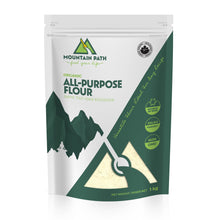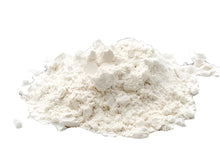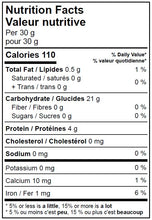Organic all-purpose enriched flour is a versatile flour made from organically grown wheat that has been milled and enriched with essential nutrients, such as iron and B vitamins, which are added back after processing. This flour is often bleached or unbleached, finely ground, and suitable for a wide range of recipes, from bread and pastries to sauces and coatings. The "organic" designation ensures it is produced without synthetic pesticides, herbicides, or chemical fertilizers, making it a healthier and environmentally sustainable option.
Key Features of Organic All-Purpose Enriched Flour
-
Appearance:
- Fine, white powder with a smooth texture.
- Unbleached varieties may have a slightly off-white color.
-
Flavor:
- Mild and neutral, making it adaptable for various recipes.
-
Texture:
- Soft and fine, ideal for creating light and airy baked goods.
-
Nutritional Profile:
- Enriched Nutrients: Typically includes added iron, niacin, thiamine, riboflavin, and folic acid.
- Moderate Protein Content: Ranges from 8–11%, suitable for most baking applications.
- Low in Fiber: Lacks the bran and germ present in whole wheat flour.
Health Benefits
-
Nutrient Fortification:
- Enrichment replaces nutrients lost during processing, supporting overall health.
-
Versatility:
- Can be used in a wide range of recipes, from breads to desserts.
-
Balanced Nutrition:
- While lower in fiber than whole wheat, it provides essential carbohydrates for energy.
Culinary Uses of Organic All-Purpose Enriched Flour
This flour is highly versatile and works well in a variety of recipes:
-
Baking:
- Ideal for cookies, cakes, muffins, and quick breads.
-
Bread Making:
- Suitable for soft rolls and flatbreads (not as strong as bread flour for artisan loaves).
-
Pastries:
- Perfect for pie crusts, biscuits, and scones due to its balanced protein content.
-
Thickening Agent:
- Use to thicken soups, stews, and sauces.
-
Frying Batter:
- A staple for breading and batters for fried foods.
How to Use Organic All-Purpose Enriched Flour
-
Substitution:
- Can replace other flours in most recipes on a 1:1 basis, except for recipes requiring specific flours like bread or cake flour.
-
Blending:
- Combine with whole wheat flour or alternative flours for added nutrition or texture.
-
Storage:
- Store in an airtight container in a cool, dry place for up to 6 months. Refrigerate or freeze for longer shelf life.
Why Choose Organic All-Purpose Enriched Flour?
-
Healthier Option:
- Free from synthetic chemicals and GMOs, ensuring a purer product.
-
Environmentally Friendly:
- Produced using sustainable agricultural practices that preserve soil health.
-
Versatility:
- Works for most cooking and baking applications, making it a pantry essential.
Comparison with Other Flours
| Flour Type | Protein Content | Texture | Best Uses |
|---|---|---|---|
| All-Purpose Flour | 8–11% | Fine, smooth | Baking, thickening, frying |
| Bread Flour | 12–14% | Slightly coarse | Yeast breads, pizza dough |
| Cake Flour | 6–8% | Very fine, soft | Cakes, delicate pastries |
| Whole Wheat Flour | 13–14% | Coarse, hearty | Hearty breads, dense baked goods |
Nutritional Notes
While organic all-purpose enriched flour offers enriched nutrients, it lacks the natural fiber and healthy fats found in whole wheat flour. It is ideal for recipes requiring a fine, neutral-tasting flour but may benefit from being blended with whole grain flours for added nutrition.
Dietary Compatibility
-
Vegan and Vegetarian:
- Suitable for plant-based diets.
-
Moderate Glycemic Index:
- Provides a quick source of energy, though not as slow-digesting as whole-grain flours.
Organic all-purpose enriched flour is a versatile and dependable pantry staple. Its balanced protein content, mild flavor, and adaptability make it an essential ingredient for everyday cooking and baking. Whether you’re preparing fluffy biscuits, decadent cakes, or crispy fried foods, this flour delivers reliable results while supporting sustainable farming practices.






